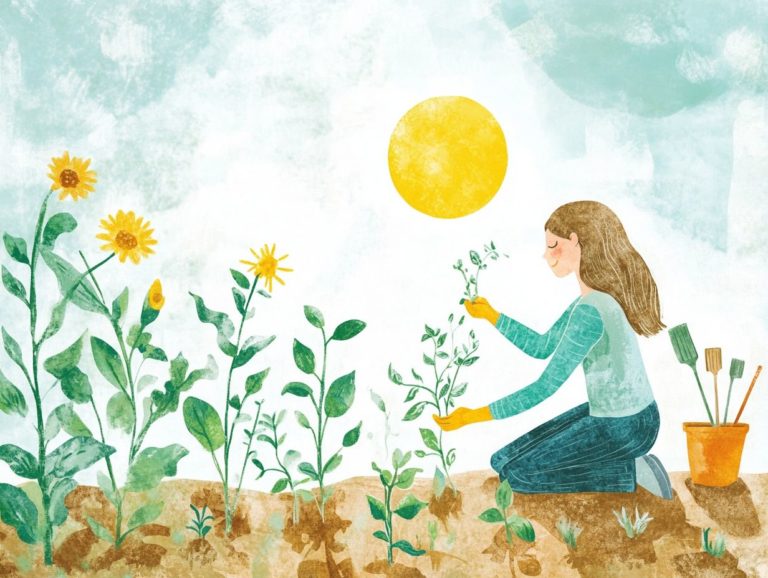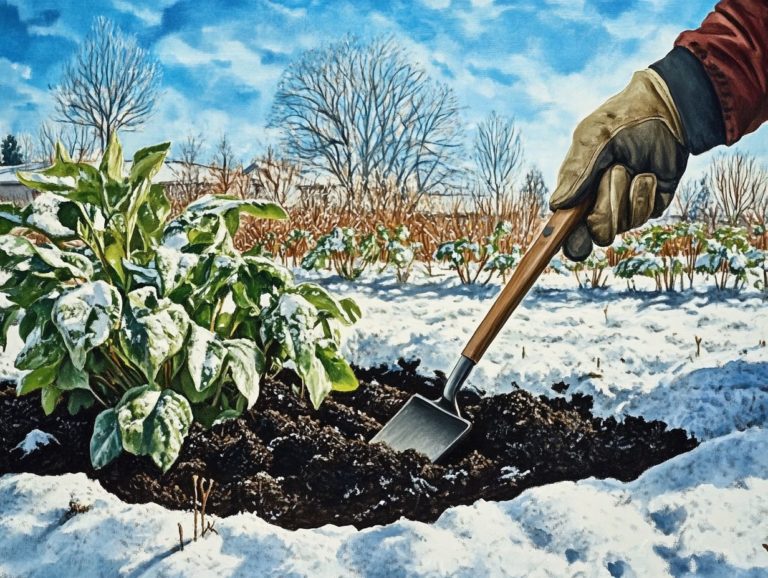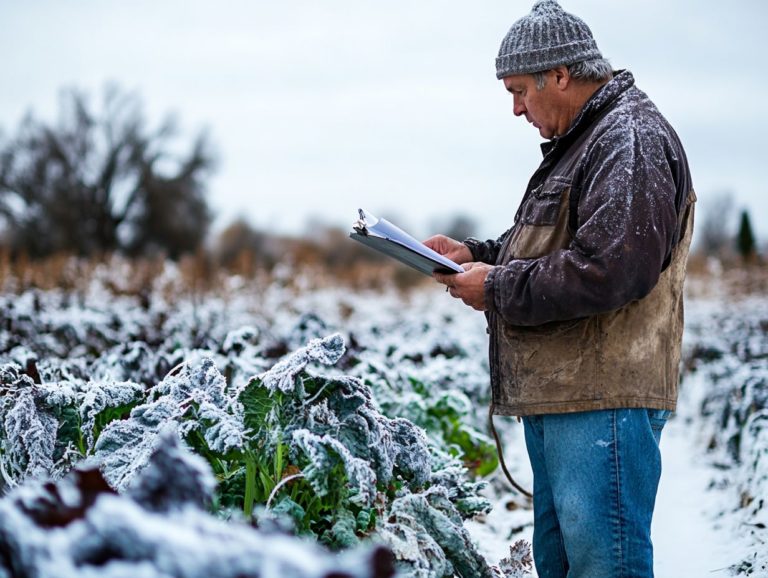The Ultimate Guide to Winter Crop Care
Winter presents distinct challenges and opportunities for crop care. You must adapt your strategies accordingly.
As you prepare your fields and manage pests and diseases, a solid grasp of winter crop maintenance can greatly influence your yields. This is especially true in the context of winter gardening.
This guide covers everything from winterizing your crops to ensuring a successful harvest. It will equip you to navigate the colder months with confidence and make the most of your homegrown produce.
Immerse yourself in these insights to elevate your winter farming practices and cultivate thriving crops, even amidst the chill of frost.
Contents
- Key Takeaways:
- Winter Crop Care Basics
- Preparing Crops for Winter
- Protecting Crops from Frost
- Managing Winter Pests and Diseases
- Winter Crop Maintenance
- Harvesting Winter Crops
- Your Winter Crop Questions Answered!
- What is winter crop care?
- Why is winter crop care important?
- What are some common winter crop care techniques for vegetable gardening?
- How do you prepare crops for winter in your planting schedule?
- What types of crops require special care during winter for fresh produce?
- What are some potential risks of not properly caring for winter vegetables during winter?
Key Takeaways:
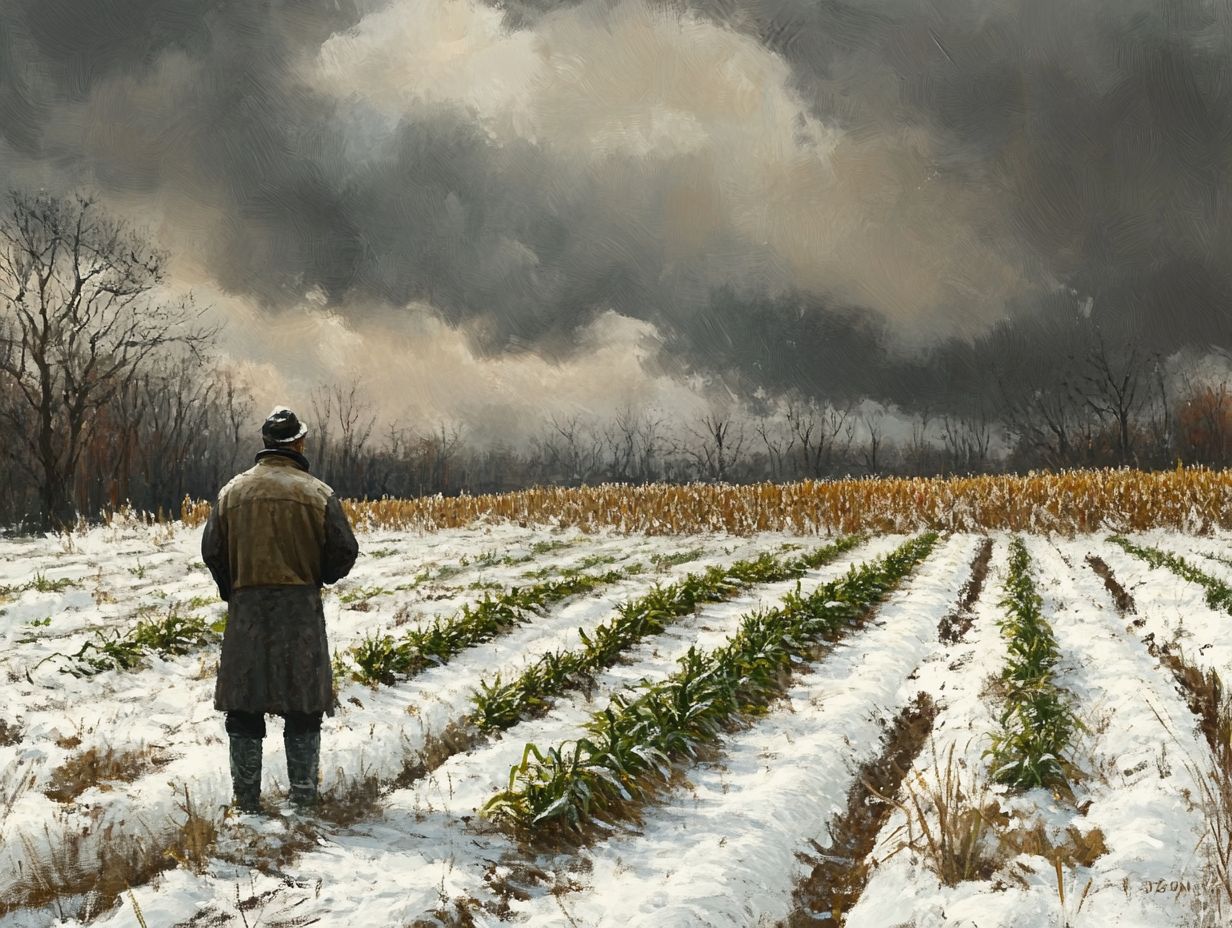
Winter Crop Care Basics
Winter crop care is crucial for your success in vegetable gardening, particularly during the colder months. By employing the right techniques, including tips for sustainable winter gardening, you can cultivate flourishing winter crops.
Familiarizing yourself with the details of winter gardening allows you to optimize your planting schedule and ensure proper soil preparation. This knowledge is key to selecting the right crops and maximizing your garden space, allowing you to enjoy fresh produce even in the depths of winter.
Understanding the Winter Season for Crops
Understanding the winter season for crops is essential for your gardening success. It comes with unique challenges and opportunities, particularly in seasonal gardening practices.
During this time, you ll face significant risks from temperature fluctuations. Nighttime lows can plunge sharply, while daytime highs create a stark contrast. Light availability is another critical factor; shorter days limit photosynthesis and can impact overall growth rates.
Some vegetables, like kale and carrots, actually thrive in these chilly conditions. They often become sweeter after a frost. However, tender plants may struggle or even die if exposed to extreme cold. By recognizing how different crops respond to winter’s chill and adjusting your planting strategies, you can maximize your yield amidst the season’s challenges.
Preparing Crops for Winter
Preparing your crops for winter is essential to successful winter gardening. This allows your garden to flourish even amidst the challenges posed by the colder months.
Steps for Winterizing Crops
Winterizing your crops involves a series of thoughtful steps. These steps can greatly enhance your chances of a successful winter harvest. Focus on selecting the right crops and implementing effective protective gardening techniques.
By meticulously planning and employing various protective measures, you can shield your plants from winter’s harsh realities. One essential tactic is mulching. This means adding a layer of material on the soil to keep it warm and moist. It also helps retain moisture and curb weed growth.
Choosing cold-resistant varieties can make a significant difference. These specially adapted species are built to thrive in lower temperatures. Using row covers adds an extra layer of frost protection, allowing your crops to flourish unscathed. Each of these strategies is crucial in ensuring that your winter crops remain robust and productive throughout the season.
Protecting Crops from Frost
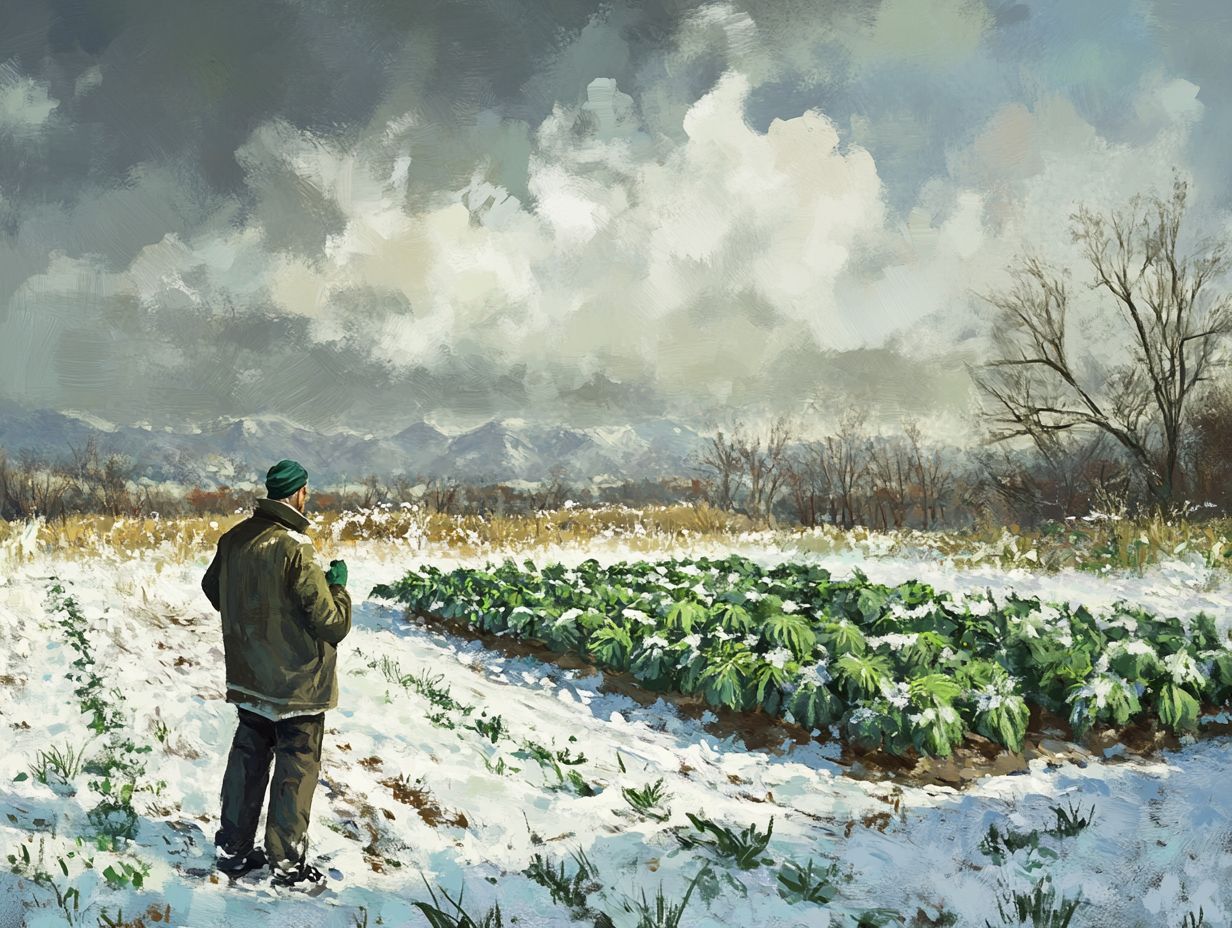
Protecting your crops from frost is essential in winter gardening. If left unaddressed, frost can significantly undermine the growth and yield of your winter vegetables.
Take proactive measures, such as using row covers, to ensure that your efforts flourish even in the colder months of winter.
Act now to safeguard your crops and ensure a thriving winter garden!
Top Tips to Protect Your Plants from Frost!
Utilizing effective methods for frost protection can significantly enhance the health of your winter crops. This ensures they withstand harsh conditions.
By employing techniques such as cloches and row covers, create cozy spots for your plants to thrive! These protective coverings trap heat and maintain a warm environment during crisp nights.
Some growers delve into heating techniques, like using heating mats or light sources that emit warmth to safeguard tender seedlings. Timing is crucial; waiting for the last expected frost date can make or break your crops!
By combining these strategies, you can cultivate resilient winter gardens that thrive even amidst challenging weather.
Managing Winter Pests and Diseases
Managing winter pests and diseases is crucial for preserving the health of your winter crops. This ensures the success of your gardening endeavors.
Even in the chill of winter, certain pests can continue to flourish, posing a threat to your plants. Stay vigilant and proactive to safeguard your garden against these challenges and enjoy a thriving winter harvest.
Common Pests and Diseases During Winter
Identifying common pests and diseases in winter is essential for effective management and prevention in your gardening efforts.
Certain insects, like aphids and spider mites, can thrive in warmer areas, posing threats to your plants. Fungal diseases, like powdery mildew, may linger even in cold months, compromising plant health.
These issues can lead to reduced crop yields and lower-quality produce, a genuine concern for both ornamental and edible gardens.
To combat these nuisances, consider implementing preventive measures. Here are some effective strategies:
- Use row covers to protect plants.
- Introduce beneficial insects to control pests.
- Rotate your crops to keep them healthy!
These strategies can significantly enhance your chances of maintaining a vibrant and thriving winter garden.
Winter Crop Maintenance
Regular maintenance is essential for your winter gardening success. This ensures that your winter vegetables thrive and remain productive during the cold months.
By dedicating time to care for your plants, you can cultivate a flourishing garden that withstands the chill and rewards you with a bountiful harvest.
Best Practices for Maintaining Crops in Winter
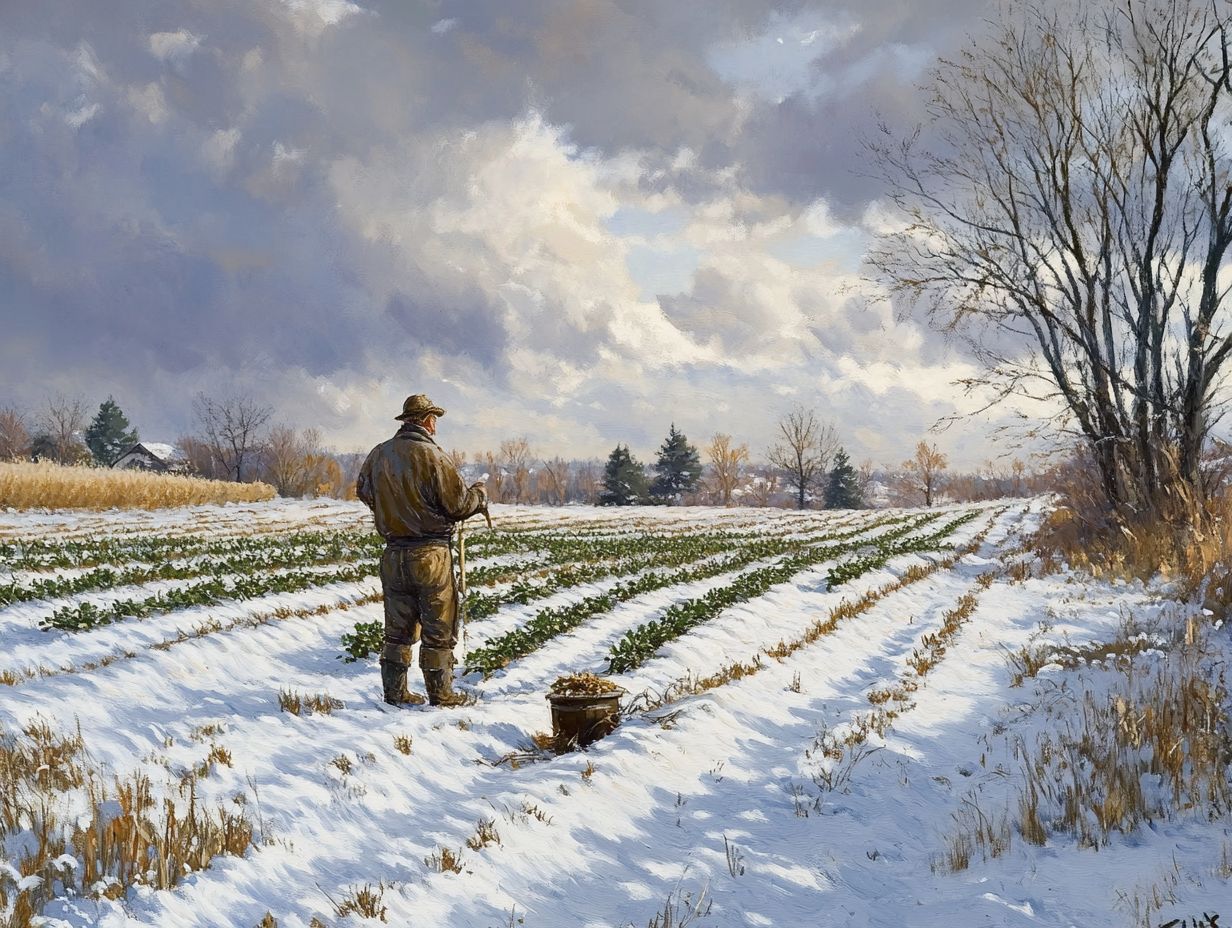
Implementing best practices for maintaining your crops in winter leads to improved harvests and enhances the overall health of your winter gardening efforts.
Establishing a routine for proper watering is essential. Ensure your plants receive just the right amount of water without becoming waterlogged.
Nutrient supplementation, especially through compost, enriches your soil and fosters robust growth during chilly months.
Managing light exposure is crucial for the vitality of your winter crops. Position them in areas where they can soak up optimal sunlight, the energy source plants use to make food.
By paying attention to these practices, you can significantly enhance the resilience and productivity of your winter garden.
Harvesting Winter Crops
Harvesting winter crops presents a rewarding experience. It provides you with the gratifying pleasure of fresh produce from your winter gardening endeavors.
Equally important is the preservation of your harvest. This ensures its longevity and extends the enjoyment of your diligent work throughout the seasons.
Start your winter gardening journey now for the best results!
Tips for Successful Winter Harvesting
Successful winter harvesting depends on specific tips and techniques that ensure your fresh produce is gathered at just the right moment. You also need to preserve it effectively.
To maximize the yield and quality of your seasonal vegetables, monitor frost conditions and harvest in the late afternoon. The warmth of the sun will make the crops easier to pick, enhancing your experience. Essential tools like sharp knives and sturdy baskets are crucial for a seamless process, so don t skimp on quality here.
After gathering your bounty, try freezing your produce to lock in flavor and nutrients, or explore pickling for an exciting twist to your winter meals. By understanding the optimal conditions and methods, you can ensure that your harvest lasts well into the colder months, transforming your winter kitchen into a haven of fresh flavors.
Your Winter Crop Questions Answered!
What is winter crop care?
Winter crop care is the process of maintaining crops during the winter season. This includes protecting them from harsh weather, managing pests, and ensuring their growth and survival.
Why is winter crop care important?
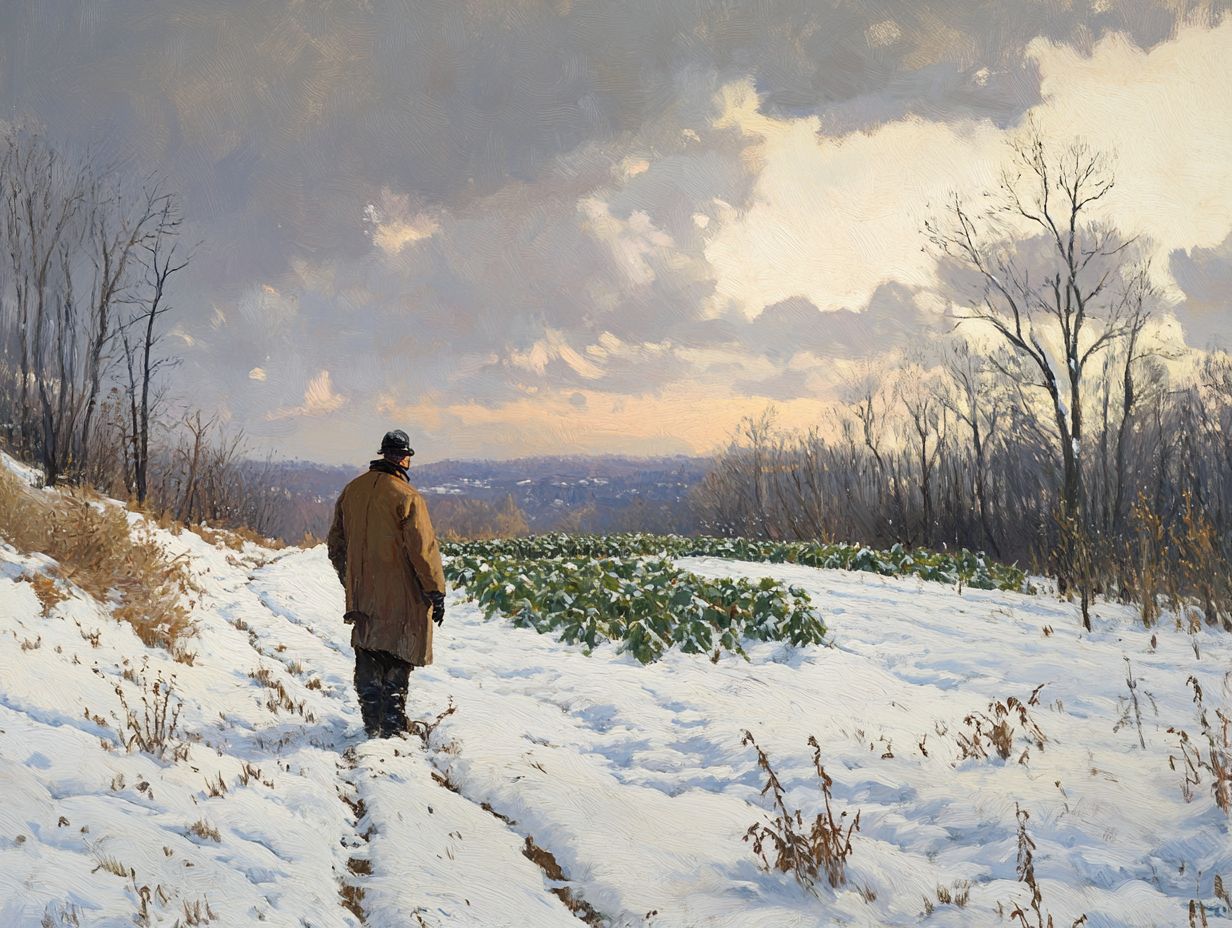
Winter crop care is vital because winter weather can harm crops, causing them to die or experience stunted growth. Proper care during this time, including effective gardening tips for crop selection, helps ensure a successful harvest in the following season.
What are some common winter crop care techniques for vegetable gardening?
- Mulching: Covering the soil with materials like straw or leaves.
- Crop rotation: Alternating the types of crops grown to maintain soil health.
- Using protective covers: Shielding crops from cold temperatures and winds.
These practices are essential for maintaining healthy winter crops.
How do you prepare crops for winter in your planting schedule?
To prepare crops for winter, harvest any remaining produce and clear the field of debris. Adding a layer of mulch protects the soil. It is also beneficial to test and amend the soil as needed, ensuring proper drainage to enhance nutrients for your winter vegetables.
What types of crops require special care during winter for fresh produce?
Tender crops, such as tomatoes and peppers, need special care during winter as they are sensitive to cold temperatures. Root vegetables like carrots and beets, as well as leafy greens like spinach and lettuce, also require extra protection to prevent freezing in the ground.
What are some potential risks of not properly caring for winter vegetables during winter?
If crops are not properly cared for during winter, they may suffer from frost damage, disease, or pest infestations. This can lead to a poor harvest or even complete crop failure, affecting your emotional well-being and seasonal gardening plans.
What methods have you found successful in preserving your harvest? Start your winter harvesting today and enjoy fresh produce all season long!

